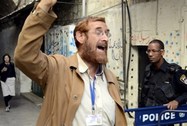4 july 2016
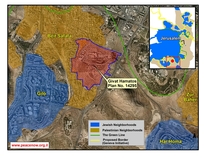
Israeli premier Benjamin Netanyahu and his war minister Avigdor Lieberman on Sunday approved plans to build 800 housing units in settlements surrounding east Jerusalem.
According to Israel's Channel 10, Netanyahu and Lieberman approved the construction of 560 housing units in Ma'ale Adumim settlement and 240 others in Pisgat Ze'ev and Har Homa settlements.
The Hebrew website Walla said the approval of these plans was part of Israeli reactions to recent Palestinian deadly attacks in al-Khalil province.
The housing units will be built directly without obtaining any other approvals, according to the website.
In a related context, Netanyahu stated that his government would make special efforts to intensify settlement construction in the West Bank and Jerusalem.
According to the Israeli media, Netanyahu issued directives during a cabinet meeting on Sunday to his ministers to work together on finding ways to support the settlements in the West Bank and Jerusalem.
He said the cabinet would discuss in the coming meeting a plan to promote settlement construction in Kiryat Arba, east of al-Khalil.
Israeli government approves 800 new colonial settlement housing units
On Sunday the Israeli Cabinet approved the expansion of several Israeli settlements in the West Bank and East Jerusalem, adding an additional 800 new units to the existing thousands of units constructed in Jewish-only settlements in direct contravention of international law.
Israeli officials say that the approval of 800 new housing units is meant to somehow ‘balance’ the implementation of a court ruling that 600 construction permits be approved for Palestinian families in Beit Safafa.
But while the Israeli officials may have political reasons for making such a claim, Palestinian analysts point out that there is no legal justification or comparison between the court decision about Beit Safafa and the announcement Sunday of the expansion of illegal Israeli settlements constructed on illegally-seized Palestinian land.
In the case involving Beit Safafa, an Israeli court ruled last month that the Israeli government had provided no sufficient evidence to back its claim that the Palestinian residents’ building permit applications should be denied, and ordered that construction could begin. But the Israeli government has, for the past month, prevented the court decision from being implemented.
The announcement Sunday that 800 new settlement units would be constructed in East Jerusalem and in the West Bank colonial settlement of Ma’ale Adumim came just two days after Israeli Prime Minister Binyamin Netanyahu approved the expansion of another colonial settlement in Hebron by 42 additional units.
All Israeli settlements constructed in the West Bank and East Jerusalem are considered illegal under international law, as they involve the direct transfer of Israel’s civilian population into areas seized by military force.
But the Israeli government considers many of these colonial settlements to be ‘legal’ under Israeli law, and provides infrastructure including water, sewage, electricity, policing and fire services to the majority of the hundreds of settlements that have been constructed on Palestinian land in East Jerusalem and the West Bank.
In the case of Beit Safafa, the Israeli government had put together a plan to completely encircle the Palestinian town with several Jewish-only settlements, thus cutting off the town from the rest of the West Bank and Jerusalem.
The plan had involved the expansion of a small trailer park currently housing Ethiopian immigrants to Israel, on a hilltop in Beit Safafa. The trailer park, dubbed ‘Givat HaMatos’, was slated for massive expansion by the Israeli government until Palestinian residents of Beit Safafa took the government to court to challenge the expansion.
In a surprise victory a month ago, the Palestinian residents of Beit Safafa won their court battle. but the Israeli government failed to implement the decision before now.
Upon the announcement that the court’s decision would be carried out, the Israeli Minister for Jerusalem, Ze’ev Elkin, stated, “Anyone who is concerned about the Jewish majority in Israel’s capital cannot push a building plan just for Arabs [in Givat HaMatos]…You cannot just approve construction for Arabs in Givat HaMatos without also approving at the same time building for Jews in the same planned neighborhood.”
The plan to encircle Beit Safafa, while currently under scrutiny by international media and bodies, is just one part of the larger E1 Jerusalem plan, which would encircle East Jerusalem, kick out most of its Palestinian residents, and claim all the ‘conquered’ territory for the state of Israel. The plan was first introduced in the early 2000s, and has expanded since then.
According to Israel's Channel 10, Netanyahu and Lieberman approved the construction of 560 housing units in Ma'ale Adumim settlement and 240 others in Pisgat Ze'ev and Har Homa settlements.
The Hebrew website Walla said the approval of these plans was part of Israeli reactions to recent Palestinian deadly attacks in al-Khalil province.
The housing units will be built directly without obtaining any other approvals, according to the website.
In a related context, Netanyahu stated that his government would make special efforts to intensify settlement construction in the West Bank and Jerusalem.
According to the Israeli media, Netanyahu issued directives during a cabinet meeting on Sunday to his ministers to work together on finding ways to support the settlements in the West Bank and Jerusalem.
He said the cabinet would discuss in the coming meeting a plan to promote settlement construction in Kiryat Arba, east of al-Khalil.
Israeli government approves 800 new colonial settlement housing units
On Sunday the Israeli Cabinet approved the expansion of several Israeli settlements in the West Bank and East Jerusalem, adding an additional 800 new units to the existing thousands of units constructed in Jewish-only settlements in direct contravention of international law.
Israeli officials say that the approval of 800 new housing units is meant to somehow ‘balance’ the implementation of a court ruling that 600 construction permits be approved for Palestinian families in Beit Safafa.
But while the Israeli officials may have political reasons for making such a claim, Palestinian analysts point out that there is no legal justification or comparison between the court decision about Beit Safafa and the announcement Sunday of the expansion of illegal Israeli settlements constructed on illegally-seized Palestinian land.
In the case involving Beit Safafa, an Israeli court ruled last month that the Israeli government had provided no sufficient evidence to back its claim that the Palestinian residents’ building permit applications should be denied, and ordered that construction could begin. But the Israeli government has, for the past month, prevented the court decision from being implemented.
The announcement Sunday that 800 new settlement units would be constructed in East Jerusalem and in the West Bank colonial settlement of Ma’ale Adumim came just two days after Israeli Prime Minister Binyamin Netanyahu approved the expansion of another colonial settlement in Hebron by 42 additional units.
All Israeli settlements constructed in the West Bank and East Jerusalem are considered illegal under international law, as they involve the direct transfer of Israel’s civilian population into areas seized by military force.
But the Israeli government considers many of these colonial settlements to be ‘legal’ under Israeli law, and provides infrastructure including water, sewage, electricity, policing and fire services to the majority of the hundreds of settlements that have been constructed on Palestinian land in East Jerusalem and the West Bank.
In the case of Beit Safafa, the Israeli government had put together a plan to completely encircle the Palestinian town with several Jewish-only settlements, thus cutting off the town from the rest of the West Bank and Jerusalem.
The plan had involved the expansion of a small trailer park currently housing Ethiopian immigrants to Israel, on a hilltop in Beit Safafa. The trailer park, dubbed ‘Givat HaMatos’, was slated for massive expansion by the Israeli government until Palestinian residents of Beit Safafa took the government to court to challenge the expansion.
In a surprise victory a month ago, the Palestinian residents of Beit Safafa won their court battle. but the Israeli government failed to implement the decision before now.
Upon the announcement that the court’s decision would be carried out, the Israeli Minister for Jerusalem, Ze’ev Elkin, stated, “Anyone who is concerned about the Jewish majority in Israel’s capital cannot push a building plan just for Arabs [in Givat HaMatos]…You cannot just approve construction for Arabs in Givat HaMatos without also approving at the same time building for Jews in the same planned neighborhood.”
The plan to encircle Beit Safafa, while currently under scrutiny by international media and bodies, is just one part of the larger E1 Jerusalem plan, which would encircle East Jerusalem, kick out most of its Palestinian residents, and claim all the ‘conquered’ territory for the state of Israel. The plan was first introduced in the early 2000s, and has expanded since then.
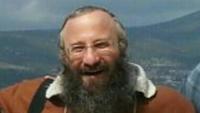
Family members of Miki Mark, who was murdered in a terror attack on Friday, opposed calls for avenging his death. Mark's daughter-in-law Yiska emphasized on social media the fact that the first people to assist the victims after the attack were a Palestinian couple.
Miki Mark and his wife Chava supported the Ben Ami family for 16 years. Its patriarch, Eliyahu, was killed in a terror attack. Miki and Chava's son Shlomi even eventually married Eliyahu's daughter, Yiska.
On Friday, he lost his father in a nearly-identical way to how Yiska lost her father years ago. In addition, Chava's nephew, Yonadav Hirschfeld, was killed eight years ago in a terror attack at the Mercaz HaRav yeshiva in Jerusalem.
Despite their loss, the Mark family's humanity has remained intact. When one of Yiska Mark's Facebook friends wrote to console her for her father-in-law's murder with the words: "murderous, scum-of-the-earth Arabs," she emphasized the fact that the first people on the scene of the accident, who gave the Mark family first aid and whose cell phone was used to call authorities to the scene of the attack, were Palestinian Arabs.
"I really have to tell you that the first to arrive at the scene was a Palestinian vehicle with an Arab couple who exited and took care of my brother-in-law and sister-in-law. They gave them a cell phone to call (the authorities), and stayed with them in those difficult moments," she wrote. "I think you should write terrorists and not Arabs because not every Arab is a terrorist, and I say this from experience."
This was not the only time when thr Mark family demonstrated their disapproval for revenge. During Miki Mark's funeral, when several youths began yelling "revenge" during the procession, Shlomi Mark called on them to stop and leave. They were also silenced by the crowd. When they continued, one of the people present urged them to "respect the family."
A short distance separates the areas where Miki Mark and Eliyahu Ben Ami were killed. Mor Leibovich, Eliyahu Ben Ami's daughter and Yiska Mark's sister, wrote on social media of the experience of learning about the attack. "Her voice was trembling," she said as she recalled the phone call with Yiska. "I was sure she was calling to tell me that we had forgotten something at their place. 'There was a terrorist attack near Otniel. (Chava) and Miki are seriously wounded. They say there's a man who was killed, and we're worried it's Miki.' My legs freeze and my breath shortens. No, no, no, God. Please no. Not again. Not Miki and (Chava).
They're the parents of Shlomi, my brother-in-law, my sister's father-in-law and mother-in-law. Wonderful and amazing people whom I have known since childhood, in Otniel, the town where I grew up, all one big family. 'Please don’t let it be Miki, Please don’t let it be Miki, Please don’t let it be Miki.' I cry silently. Later, the bitter truth was revealed to me. Miki is gone."
Leibovich later added, "Miki, the man who supported (my) mother and us so much since my father was killed. Miki, who hosted us just last Shavuot. His voice stil rings in my ears. Miki, who always greeted us with a smile on his face, with giggles and humor, the man with that huge heart."
Chava Mark is still hospitalized in the Hadassah Ein Kerem hospital in Jerusalem. The hospital stated Sunday that she has regained consciousness. She is also reportedly breathing independently and is in stable condition. Hadassah Ein Kerem Shock Trauma Unit director Prof. Avi Ribkind said that Mark has woken up, but is still not speaking. She does, however, respond when her name is called.
Chava Mark has, sadly, experienced grief of this king before. Her nephew Yonadav Hirschfeld was killed in the 2008 terrorist attack at the Mercaz HaRav yeshiva in Jerusalem. "On Friday, when I heard of the attack, I sent Miki a 'how are you?' message and he didn't answer," said Tzemach Hirschfeld, Yonadav's father. "I was feeling unwell up to the point that my wife's brother called and said that their car had been hit. I had to tell my wife's mother that her son-in-law had been killed. We went into the Sabbath when (Chava), my wife's sister, was still in the operating room, and the we didn't know her condition for the entire Sabbath."
Of his feelings in the attack's aftermath, Hirschfeld said, "There are two levels. On the personal level, it's very hard. The first thought is 'Oh no, not again.' On the national level – we aren't doing what we need to do. We have enemies – it starts with incitement, stones, bottles, and firearms."
Miki Mark and his wife Chava supported the Ben Ami family for 16 years. Its patriarch, Eliyahu, was killed in a terror attack. Miki and Chava's son Shlomi even eventually married Eliyahu's daughter, Yiska.
On Friday, he lost his father in a nearly-identical way to how Yiska lost her father years ago. In addition, Chava's nephew, Yonadav Hirschfeld, was killed eight years ago in a terror attack at the Mercaz HaRav yeshiva in Jerusalem.
Despite their loss, the Mark family's humanity has remained intact. When one of Yiska Mark's Facebook friends wrote to console her for her father-in-law's murder with the words: "murderous, scum-of-the-earth Arabs," she emphasized the fact that the first people on the scene of the accident, who gave the Mark family first aid and whose cell phone was used to call authorities to the scene of the attack, were Palestinian Arabs.
"I really have to tell you that the first to arrive at the scene was a Palestinian vehicle with an Arab couple who exited and took care of my brother-in-law and sister-in-law. They gave them a cell phone to call (the authorities), and stayed with them in those difficult moments," she wrote. "I think you should write terrorists and not Arabs because not every Arab is a terrorist, and I say this from experience."
This was not the only time when thr Mark family demonstrated their disapproval for revenge. During Miki Mark's funeral, when several youths began yelling "revenge" during the procession, Shlomi Mark called on them to stop and leave. They were also silenced by the crowd. When they continued, one of the people present urged them to "respect the family."
A short distance separates the areas where Miki Mark and Eliyahu Ben Ami were killed. Mor Leibovich, Eliyahu Ben Ami's daughter and Yiska Mark's sister, wrote on social media of the experience of learning about the attack. "Her voice was trembling," she said as she recalled the phone call with Yiska. "I was sure she was calling to tell me that we had forgotten something at their place. 'There was a terrorist attack near Otniel. (Chava) and Miki are seriously wounded. They say there's a man who was killed, and we're worried it's Miki.' My legs freeze and my breath shortens. No, no, no, God. Please no. Not again. Not Miki and (Chava).
They're the parents of Shlomi, my brother-in-law, my sister's father-in-law and mother-in-law. Wonderful and amazing people whom I have known since childhood, in Otniel, the town where I grew up, all one big family. 'Please don’t let it be Miki, Please don’t let it be Miki, Please don’t let it be Miki.' I cry silently. Later, the bitter truth was revealed to me. Miki is gone."
Leibovich later added, "Miki, the man who supported (my) mother and us so much since my father was killed. Miki, who hosted us just last Shavuot. His voice stil rings in my ears. Miki, who always greeted us with a smile on his face, with giggles and humor, the man with that huge heart."
Chava Mark is still hospitalized in the Hadassah Ein Kerem hospital in Jerusalem. The hospital stated Sunday that she has regained consciousness. She is also reportedly breathing independently and is in stable condition. Hadassah Ein Kerem Shock Trauma Unit director Prof. Avi Ribkind said that Mark has woken up, but is still not speaking. She does, however, respond when her name is called.
Chava Mark has, sadly, experienced grief of this king before. Her nephew Yonadav Hirschfeld was killed in the 2008 terrorist attack at the Mercaz HaRav yeshiva in Jerusalem. "On Friday, when I heard of the attack, I sent Miki a 'how are you?' message and he didn't answer," said Tzemach Hirschfeld, Yonadav's father. "I was feeling unwell up to the point that my wife's brother called and said that their car had been hit. I had to tell my wife's mother that her son-in-law had been killed. We went into the Sabbath when (Chava), my wife's sister, was still in the operating room, and the we didn't know her condition for the entire Sabbath."
Of his feelings in the attack's aftermath, Hirschfeld said, "There are two levels. On the personal level, it's very hard. The first thought is 'Oh no, not again.' On the national level – we aren't doing what we need to do. We have enemies – it starts with incitement, stones, bottles, and firearms."
2014, when an assassination attempt took place in Jerusalem, over Glick’s extremist policies and racial incitement towards Palestinians.
3 july 2016
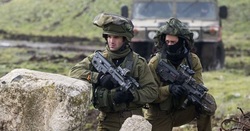
A security cordon has been imposed by the Israeli occupation forces (IOF) on the southern West Bank province of al-Khalil for the third day running.
A PIC news correspondent said the IOF soldiers have sealed off Palestinian towns and villages in and around al-Khalil.
Violent clashes burst out shortly after the IOF rolled into Bani Na’im town, to the east, and attacked the Palestinian protesters with heavy spates of stun grenades and teargas canisters.
The IOF kidnapped the sister of the slain Palestinian anti-occupation youth Muhammad Al-Tarayra from the city. Violent clashes with the Israeli troops also rocked the Fawar refugee camp, in southern al-Khalil, after the IOF soldiers wreaked havoc on civilian homes in search for the Palestinian instructor Fedha Hadeeb and policeman Tareq Hadeeb, along with another youth.
The soldiers aggressively attacked the youngsters Luay Masharqa and Luay Hadeeb after they tied them to electricity poles. Confrontations flared up at the Beit Ainun crossroads, to the north, as large IOF troops have been deployed across the area to protect Israeli stone-throwers.
An Israeli army patrol stormed the family home of the slain Palestinian girl Kalzar al-Aweiwi and forced the inhabitants out. The IOF further kidnapped Major General Khaled al-Madhoun from his home in Jabal al-Rahma, in al-Khalil.
The assault culminated in the abduction of two youngsters from Bethlehem’s southern town of Beit Fajjar along with journalist Amjad Arafa from Occupied Jerusalem. A series of military checkpoints has been pitched by the IOF across al-Khalil, blocking Palestinians’ movement in and out.
Meanwhile, a number of Palestinians have been left injured as Israeli settler gangs attacked vehicles driving in southern and western Nablus city.
A PIC news correspondent said the IOF soldiers have sealed off Palestinian towns and villages in and around al-Khalil.
Violent clashes burst out shortly after the IOF rolled into Bani Na’im town, to the east, and attacked the Palestinian protesters with heavy spates of stun grenades and teargas canisters.
The IOF kidnapped the sister of the slain Palestinian anti-occupation youth Muhammad Al-Tarayra from the city. Violent clashes with the Israeli troops also rocked the Fawar refugee camp, in southern al-Khalil, after the IOF soldiers wreaked havoc on civilian homes in search for the Palestinian instructor Fedha Hadeeb and policeman Tareq Hadeeb, along with another youth.
The soldiers aggressively attacked the youngsters Luay Masharqa and Luay Hadeeb after they tied them to electricity poles. Confrontations flared up at the Beit Ainun crossroads, to the north, as large IOF troops have been deployed across the area to protect Israeli stone-throwers.
An Israeli army patrol stormed the family home of the slain Palestinian girl Kalzar al-Aweiwi and forced the inhabitants out. The IOF further kidnapped Major General Khaled al-Madhoun from his home in Jabal al-Rahma, in al-Khalil.
The assault culminated in the abduction of two youngsters from Bethlehem’s southern town of Beit Fajjar along with journalist Amjad Arafa from Occupied Jerusalem. A series of military checkpoints has been pitched by the IOF across al-Khalil, blocking Palestinians’ movement in and out.
Meanwhile, a number of Palestinians have been left injured as Israeli settler gangs attacked vehicles driving in southern and western Nablus city.
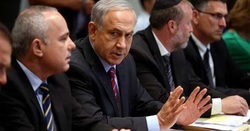
The Israeli security cabinet on Saturday decided not to return the bodies of Palestinian martyrs to their families and bury them secretly in a new cemetery allocated for them.
The Israeli government claims the step is part of other punitive measures taken against the Palestinians in both the West Bank and Jerusalem in response to recent deadly attacks against Jewish settlers.
Since al-Quds intifada (uprising) started in early October last year in response to Israel's escalation of violations against the Palestinians and their holy sites, the Israeli security authorities have been withholding bodies of attackers as a punitive measure.
This practice was implemented mainly against attackers who were residents of east Jerusalem.
While bodies of attackers from the West Bank are usually returned to their families within a short time, the bodies of attackers from east Jerusalem have been withheld by the Israeli occupation police since the start of the intifada.
The security cabinet also decided during that meeting to impose a complete closure on al-Khalil province, where two deadly attacks happened recently.
Other reprisal measures include seizing some of the tax funds collected on behalf of the Palestinian Authority and its government, building 42 housing units in Kiryat Arba settlement, and cancelling work permits for some 2,800 Palestinians from Bani Na'im village, where one of the attackers came from.
The Israeli government claims the step is part of other punitive measures taken against the Palestinians in both the West Bank and Jerusalem in response to recent deadly attacks against Jewish settlers.
Since al-Quds intifada (uprising) started in early October last year in response to Israel's escalation of violations against the Palestinians and their holy sites, the Israeli security authorities have been withholding bodies of attackers as a punitive measure.
This practice was implemented mainly against attackers who were residents of east Jerusalem.
While bodies of attackers from the West Bank are usually returned to their families within a short time, the bodies of attackers from east Jerusalem have been withheld by the Israeli occupation police since the start of the intifada.
The security cabinet also decided during that meeting to impose a complete closure on al-Khalil province, where two deadly attacks happened recently.
Other reprisal measures include seizing some of the tax funds collected on behalf of the Palestinian Authority and its government, building 42 housing units in Kiryat Arba settlement, and cancelling work permits for some 2,800 Palestinians from Bani Na'im village, where one of the attackers came from.
2 july 2016
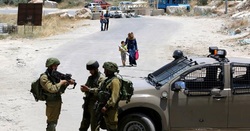
The Israeli government has decided to reduce the monthly transfers of tax funds collected on behalf of the Palestinian Authority and to impose a tight military blockade on al-Khalil province in response to a recent wave of Palestinian attacks against settlers in the West Bank.
The Israeli army, in turn, started to deploy two additional battalions in the West Bank to boost its military presence and provide more protection for Jewish settlers.
More troops were sent, in particular, to al-Khalil province to encircle the city and its towns and refugee camps after local young men carried out deadly attacks against Israelis.
According to the Palestinian Information Center (PIC) reporter in the province that the Israeli army closed several areas in al-Khalil with mounds of dirt and military barriers, including in Bani Na'im town, al-Fawwar refugee camp, al-Dhahiriya town and as-Samua town.
The Israeli army also declared Bani Na'im a closed military zone and decided to withdraw all Jerusalem entry permits from its residents.
East of al-Khalil, a large number of Israeli troops stormed Deir Razeh town and carried out house-to-house searches. A similar campaign took place in Wadi al-Shajna village near al-Khalil.
The Israeli army, in turn, started to deploy two additional battalions in the West Bank to boost its military presence and provide more protection for Jewish settlers.
More troops were sent, in particular, to al-Khalil province to encircle the city and its towns and refugee camps after local young men carried out deadly attacks against Israelis.
According to the Palestinian Information Center (PIC) reporter in the province that the Israeli army closed several areas in al-Khalil with mounds of dirt and military barriers, including in Bani Na'im town, al-Fawwar refugee camp, al-Dhahiriya town and as-Samua town.
The Israeli army also declared Bani Na'im a closed military zone and decided to withdraw all Jerusalem entry permits from its residents.
East of al-Khalil, a large number of Israeli troops stormed Deir Razeh town and carried out house-to-house searches. A similar campaign took place in Wadi al-Shajna village near al-Khalil.
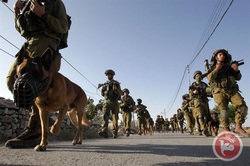
The Israeli-imposed blockade on the occupied southern West Bank district of Hebron (al-Khalil) remained in effect, on Saturday, after Israeli forces sealed the entire district while maintaining a complete lock-down on the village of Bani Naim, and revoking travel permits to Israel for some 2,700 of its residents, and reportedly detaining several Palestinians across Hebron, overnight.
Hebron’s closure was implemented on Friday amid a massive manhunt for the suspect responsible for a shooting attack that left an Israeli man dead, his wife critically injured, and his two children lightly-to-moderately injured while driving in their car near the Otniel settlement, to the south of Hebron, where the family was from.
Israeli forces deployed heavily across Hebron, overnight Friday, and took into their custody several “suspects” in connection to the shooting, Israeli media reported. However, an Israeli army spokesperson told Ma’an News Agency that they did not have reports of any detentions being made in the West Bank at all, despite the fact that detention raids are carried out on a near nightly basis, particularly in the wake of attacks on Israeli targets.
Israeli forces closed the entrances of the villages of Beit Anun, Sair, al-Thahiriyah, al-Fawwar, al-Samu, Dura, Farsh al-Hawa, and al-Fawwar refugee camp while blocking the entrance of the village of Nabi Yunis with large cement blocks, according to locals.
Israeli checkpoints were also erected at the entrances of Sair, al-Hawawir, and the al-Arrub refugee camp as Israeli forces searched any cars attempting to cross the checkpoints. Locals said the main entrance to Beit Ummar was closed with an iron gate.
Locals and Palestinian security sources said that Israeli soldiers and military vehicles were deployed from the village of al-Samu in the southern part of Hebron, to the al-Arrub refugee camp, in the north.
An Israeli army spokesperson said that all crossings to and from Hebron have been closed, with the exception of urgent humanitarian cases, to “prevent terrorists from carrying out attacks.” The spokesperson could not provide details on the expected duration of the blockade.
Meanwhile, Israeli forces have imposed a complete lock-down on the village of Bani Naim, in Hebron, the hometown of 17-year-old Muhammad Tarayra, who was killed on Thursday after stabbing a 13-year-old Israeli girl to death, in nearby Kiryat Arba — a major illegal Israeli settlement built on privately-held Palestinian land used as a central connecting point for the expansion of illegal settlements, into the city of Hebron.
A spokesperson of the Coordination of Government Activities in the Territories (COGAT), responsible for implementing Israeli policies in the occupied Palestinian territory, confirmed 2,700 Palestinians had their permits revoked that allowed them to travel outside of the occupied West Bank and work in Israel.
A young Palestinian woman, identified as 27-year-old Sarah Tarayra, also from Bani Naim, was killed on Friday by Israeli forces after allegedly carrying out a stab attack that left two Israelis wounded.
Although the two slain Palestinians from Bani Naim share the same surname, it remained unclear whether the two were related.
Another Palestinian was shot dead on Thursday by an Israeli civilian after allegedly carrying out a stab attack in the Israeli coastal city of Netanya that left two Israelis wounded. His hometown in the northern occupied West Bank district of Tulkarem has also been placed under blockade.
The town of Yatta in Hebron, where two cousins originated from who carried out a shooting in Tel Aviv last month that left four Israelis killed and more than a dozen injured, has also been tightly closed by Israeli forces, according to Israeli media. Following the attack, Israeli forces sealed off the town and carried out nightly detention raids in the community, including implementing a large-scale closure on the West Bank and Gaza Strip and revoking the permits of 83,000 Palestinians to enter Israel.
The recent closure on the district of Hebron is said to be the greatest closure placed inside the occupied West Bank since 2014 when three Israeli teenagers were kidnapped and then killed.
The Israeli Prime Minister’s office on Friday also ordered that the money being transferred by the Palestinian Authority to “terrorists and their families” be deducted immediately from monthly tax revenues — a total of $130 million, referring to money paid by the PA to former Palestinian prisoners, families of prisoners in Israeli custody, and families of Palestinians killed by Israeli forces.
Meanwhile, Israel’s Education Minister Naftali Bennett, head of the far-right Jewish Home party, told Haaretz on Friday that he had asked Israeli Prime Minister Benjamin Netanyahu to immediately convene the security cabinet following the attack in Kiryat Arba. A meeting is expected to be held on Saturday.
Bennett said he intends to propose a number of punitive measures in response to the attacks at the meeting including the construction of new residential and industrial areas in Kiryat Arba, plans for which have already been approved.
The minister also told Haaretz he will propose that the mother and sister of the Palestinian who carried out the Kiryat Arba attack be arrested, and that Israeli authorities carry out all approved demolition orders against Palestinian structures for not having the required permits.
Bennet will also reportedly suggest that internet and cellular access be cut off in Hebron to prevent “incitement.”
In less than two days, three Palestinians have been killed after allegedly carrying out attacks on Israelis — and a fourth died during clashes, marking an uptick in violence after a few months of relative reprieve from a wave of violence and unrest that swept across the occupied Palestinian territory and Israel since October, leaving more than 220 Palestinians and some 31 Israelis killed.
The Hebron area in particular grew as the epicenter of upheaval, with Israeli authorities severely restricting the movement of Palestinians by declaring the area of Tel Rumeida and other parts of the Old City as a “closed military zone” for several months in November amid dozens of incidents where more than 40 Palestinians were killed.
Israel’s response to attacks — such as punitive home demolitions, sealing entire villages, mass detention campaigns, and withholding the bodies of Palestinians slain while committing attacks — have been condemned by rights groups, who have said the measures amount to “collective punishment” and represent a clear violation of international law.
Hebron’s closure was implemented on Friday amid a massive manhunt for the suspect responsible for a shooting attack that left an Israeli man dead, his wife critically injured, and his two children lightly-to-moderately injured while driving in their car near the Otniel settlement, to the south of Hebron, where the family was from.
Israeli forces deployed heavily across Hebron, overnight Friday, and took into their custody several “suspects” in connection to the shooting, Israeli media reported. However, an Israeli army spokesperson told Ma’an News Agency that they did not have reports of any detentions being made in the West Bank at all, despite the fact that detention raids are carried out on a near nightly basis, particularly in the wake of attacks on Israeli targets.
Israeli forces closed the entrances of the villages of Beit Anun, Sair, al-Thahiriyah, al-Fawwar, al-Samu, Dura, Farsh al-Hawa, and al-Fawwar refugee camp while blocking the entrance of the village of Nabi Yunis with large cement blocks, according to locals.
Israeli checkpoints were also erected at the entrances of Sair, al-Hawawir, and the al-Arrub refugee camp as Israeli forces searched any cars attempting to cross the checkpoints. Locals said the main entrance to Beit Ummar was closed with an iron gate.
Locals and Palestinian security sources said that Israeli soldiers and military vehicles were deployed from the village of al-Samu in the southern part of Hebron, to the al-Arrub refugee camp, in the north.
An Israeli army spokesperson said that all crossings to and from Hebron have been closed, with the exception of urgent humanitarian cases, to “prevent terrorists from carrying out attacks.” The spokesperson could not provide details on the expected duration of the blockade.
Meanwhile, Israeli forces have imposed a complete lock-down on the village of Bani Naim, in Hebron, the hometown of 17-year-old Muhammad Tarayra, who was killed on Thursday after stabbing a 13-year-old Israeli girl to death, in nearby Kiryat Arba — a major illegal Israeli settlement built on privately-held Palestinian land used as a central connecting point for the expansion of illegal settlements, into the city of Hebron.
A spokesperson of the Coordination of Government Activities in the Territories (COGAT), responsible for implementing Israeli policies in the occupied Palestinian territory, confirmed 2,700 Palestinians had their permits revoked that allowed them to travel outside of the occupied West Bank and work in Israel.
A young Palestinian woman, identified as 27-year-old Sarah Tarayra, also from Bani Naim, was killed on Friday by Israeli forces after allegedly carrying out a stab attack that left two Israelis wounded.
Although the two slain Palestinians from Bani Naim share the same surname, it remained unclear whether the two were related.
Another Palestinian was shot dead on Thursday by an Israeli civilian after allegedly carrying out a stab attack in the Israeli coastal city of Netanya that left two Israelis wounded. His hometown in the northern occupied West Bank district of Tulkarem has also been placed under blockade.
The town of Yatta in Hebron, where two cousins originated from who carried out a shooting in Tel Aviv last month that left four Israelis killed and more than a dozen injured, has also been tightly closed by Israeli forces, according to Israeli media. Following the attack, Israeli forces sealed off the town and carried out nightly detention raids in the community, including implementing a large-scale closure on the West Bank and Gaza Strip and revoking the permits of 83,000 Palestinians to enter Israel.
The recent closure on the district of Hebron is said to be the greatest closure placed inside the occupied West Bank since 2014 when three Israeli teenagers were kidnapped and then killed.
The Israeli Prime Minister’s office on Friday also ordered that the money being transferred by the Palestinian Authority to “terrorists and their families” be deducted immediately from monthly tax revenues — a total of $130 million, referring to money paid by the PA to former Palestinian prisoners, families of prisoners in Israeli custody, and families of Palestinians killed by Israeli forces.
Meanwhile, Israel’s Education Minister Naftali Bennett, head of the far-right Jewish Home party, told Haaretz on Friday that he had asked Israeli Prime Minister Benjamin Netanyahu to immediately convene the security cabinet following the attack in Kiryat Arba. A meeting is expected to be held on Saturday.
Bennett said he intends to propose a number of punitive measures in response to the attacks at the meeting including the construction of new residential and industrial areas in Kiryat Arba, plans for which have already been approved.
The minister also told Haaretz he will propose that the mother and sister of the Palestinian who carried out the Kiryat Arba attack be arrested, and that Israeli authorities carry out all approved demolition orders against Palestinian structures for not having the required permits.
Bennet will also reportedly suggest that internet and cellular access be cut off in Hebron to prevent “incitement.”
In less than two days, three Palestinians have been killed after allegedly carrying out attacks on Israelis — and a fourth died during clashes, marking an uptick in violence after a few months of relative reprieve from a wave of violence and unrest that swept across the occupied Palestinian territory and Israel since October, leaving more than 220 Palestinians and some 31 Israelis killed.
The Hebron area in particular grew as the epicenter of upheaval, with Israeli authorities severely restricting the movement of Palestinians by declaring the area of Tel Rumeida and other parts of the Old City as a “closed military zone” for several months in November amid dozens of incidents where more than 40 Palestinians were killed.
Israel’s response to attacks — such as punitive home demolitions, sealing entire villages, mass detention campaigns, and withholding the bodies of Palestinians slain while committing attacks — have been condemned by rights groups, who have said the measures amount to “collective punishment” and represent a clear violation of international law.
1 july 2016
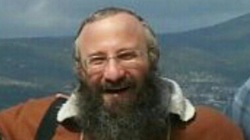
Rabbi Michael (Miki) Mark 48
One person has been killed after bullets were fired at a travelling vehicle; Reports indicate that the victims were all part of the same family.
A father has been killed, a mother critically wounded, and their two children injured in a shooting attack, which took place on route 60 in the southern West Bank between Beit Hagai and Otniel.
According to reports, the family was driving in thire car when the tailing terrorists began to overtake them and opened fire.
AT least 19 shots were fired, and the attacked family's car flipped as the driver was shot. The terrorist then fled the scene in their vehicle, prompting security forces to launch a widescale search that continues.
Magen David Adom (MDA) paramedics were called to the scene and provided emergency treatment. The 40-year-old mother was evacuated in serious condition to Hadassah Ein Kerem Medical Center with serious wounds to her upper body. She was anesthetized and artificially ventilated. A 14-year-old boy and a one year old were also evacuated to Ein Kerem in moderate and light condition respectively.
Murdered: Miki Mark, father of ten, yeshiva director
The man killed today in the terrorist attack on his family in their car in Har Hevron was a father of ten and 'a pillar of the community;' his longtime friend, MK Yehuda Glick, learned with him at yeshiva.
The man murdered before his wife and two of his ten children whilst driving them on Friday was Rabbi Michael "Miki" Mark, a 48 year old from Otniel, the cousin of Mossad chief Yossi Cohen. Miki's wife, Chava, 40, was seriously wounded, their 13-year-old daughter Tehila was moderately-to-seriously wounded, and their 15-year-old son Pedayah was lightly wounded. Beside the son, every member of the family was shot by terrorists who drove past their car travelling on Route 60 in Har Hevron.
The murdered father was the director of a yeshiva in Otniel and a very well-known figure in his regional council. Otniel's secretary, Eran Dgani, said, "Miki was a pillar of the settlement and of Har Hevron. He was one of the pioneers of the settlement. He was a very modest and honest man, a man of action in every inch of his body.
Miki ran the yeshiva in Otniel for years, and he ran the company for the development of Har Hevron and led to extraordinary accomplishments. He was a man of faith and spirit, and he spent every moment of his free time studying torah. He was a gentle man and a devoted father to his family. His absence in the settlement will be great."
Dgani asked to transfer a message to the terrorists: "You try to scare us so that we'll wear down, break, and leave, but it's all for naught. The sentiments in Otniel are not of fear and exhaustion, but rather of cohesion, resilience and especially a strong desire to move forward. The murderers that imagine eliminating us through bloodshed will find before them again and again a solid wall of people who believe in life a lot more than those same murderers believe in death."
The Marks have ten children: Shlomi, Shira, Natanel, Yehoshua, Miriam, Orit, Pedaya, Tehila, Rinat, and Esther.
MK Yehuda Glick (Likud) was one of Miki's best friend from their yeshiva today togethers in Alon Shvut. "He was like a brother to me," said Glick on Friday afternoon. "Tonight, at the entry of the Sabbath, I'll make Kiddush with the cup that he gave to me as a gift for my 40th birthday."
Har Hevron Regional Council head Yochay Damri released a message to the council's citizens: "Dear Residents, Our blood boils; again, we have experienced a shocking murder, and again on the Sabbath eve against a Har Hevron family. A dear resident was murdered before his two children, and his wife was seriously wounded. We are in great pain from this situation. This is a well-known family. And we pray for the girl's well-being.
"This is an exceptional incident. For a long time in Otniel and Har Hevron, we have experienced difficult events, and today an additional event, but they will not break us! A peaceful Sabbath and a warm and lamenting hug to all."
President Reuven Rivlin released his condolences in a statment: "I want to give strength to the Mark family, after the murder of their dear father Michael (Miki), and I join in the prayers being said now across Israel for the full recovery of the family's mother and children... At this difficult time, I also want to offer my support to the IDF and the security services, who will apprehend these vicious murderers."
One person has been killed after bullets were fired at a travelling vehicle; Reports indicate that the victims were all part of the same family.
A father has been killed, a mother critically wounded, and their two children injured in a shooting attack, which took place on route 60 in the southern West Bank between Beit Hagai and Otniel.
According to reports, the family was driving in thire car when the tailing terrorists began to overtake them and opened fire.
AT least 19 shots were fired, and the attacked family's car flipped as the driver was shot. The terrorist then fled the scene in their vehicle, prompting security forces to launch a widescale search that continues.
Magen David Adom (MDA) paramedics were called to the scene and provided emergency treatment. The 40-year-old mother was evacuated in serious condition to Hadassah Ein Kerem Medical Center with serious wounds to her upper body. She was anesthetized and artificially ventilated. A 14-year-old boy and a one year old were also evacuated to Ein Kerem in moderate and light condition respectively.
Murdered: Miki Mark, father of ten, yeshiva director
The man killed today in the terrorist attack on his family in their car in Har Hevron was a father of ten and 'a pillar of the community;' his longtime friend, MK Yehuda Glick, learned with him at yeshiva.
The man murdered before his wife and two of his ten children whilst driving them on Friday was Rabbi Michael "Miki" Mark, a 48 year old from Otniel, the cousin of Mossad chief Yossi Cohen. Miki's wife, Chava, 40, was seriously wounded, their 13-year-old daughter Tehila was moderately-to-seriously wounded, and their 15-year-old son Pedayah was lightly wounded. Beside the son, every member of the family was shot by terrorists who drove past their car travelling on Route 60 in Har Hevron.
The murdered father was the director of a yeshiva in Otniel and a very well-known figure in his regional council. Otniel's secretary, Eran Dgani, said, "Miki was a pillar of the settlement and of Har Hevron. He was one of the pioneers of the settlement. He was a very modest and honest man, a man of action in every inch of his body.
Miki ran the yeshiva in Otniel for years, and he ran the company for the development of Har Hevron and led to extraordinary accomplishments. He was a man of faith and spirit, and he spent every moment of his free time studying torah. He was a gentle man and a devoted father to his family. His absence in the settlement will be great."
Dgani asked to transfer a message to the terrorists: "You try to scare us so that we'll wear down, break, and leave, but it's all for naught. The sentiments in Otniel are not of fear and exhaustion, but rather of cohesion, resilience and especially a strong desire to move forward. The murderers that imagine eliminating us through bloodshed will find before them again and again a solid wall of people who believe in life a lot more than those same murderers believe in death."
The Marks have ten children: Shlomi, Shira, Natanel, Yehoshua, Miriam, Orit, Pedaya, Tehila, Rinat, and Esther.
MK Yehuda Glick (Likud) was one of Miki's best friend from their yeshiva today togethers in Alon Shvut. "He was like a brother to me," said Glick on Friday afternoon. "Tonight, at the entry of the Sabbath, I'll make Kiddush with the cup that he gave to me as a gift for my 40th birthday."
Har Hevron Regional Council head Yochay Damri released a message to the council's citizens: "Dear Residents, Our blood boils; again, we have experienced a shocking murder, and again on the Sabbath eve against a Har Hevron family. A dear resident was murdered before his two children, and his wife was seriously wounded. We are in great pain from this situation. This is a well-known family. And we pray for the girl's well-being.
"This is an exceptional incident. For a long time in Otniel and Har Hevron, we have experienced difficult events, and today an additional event, but they will not break us! A peaceful Sabbath and a warm and lamenting hug to all."
President Reuven Rivlin released his condolences in a statment: "I want to give strength to the Mark family, after the murder of their dear father Michael (Miki), and I join in the prayers being said now across Israel for the full recovery of the family's mother and children... At this difficult time, I also want to offer my support to the IDF and the security services, who will apprehend these vicious murderers."
Page: 2 - 1
